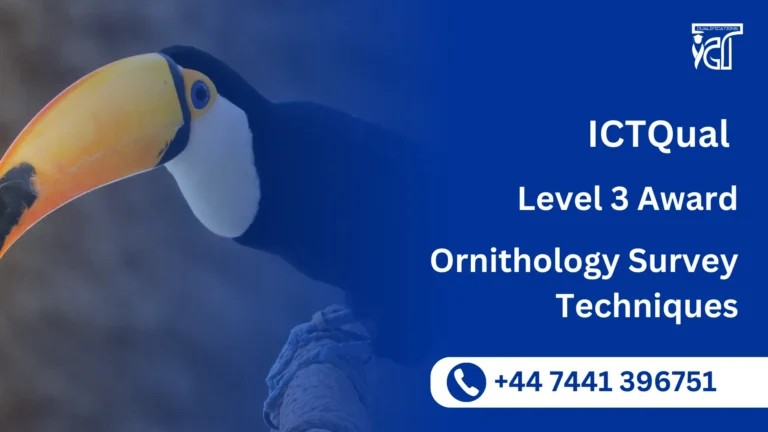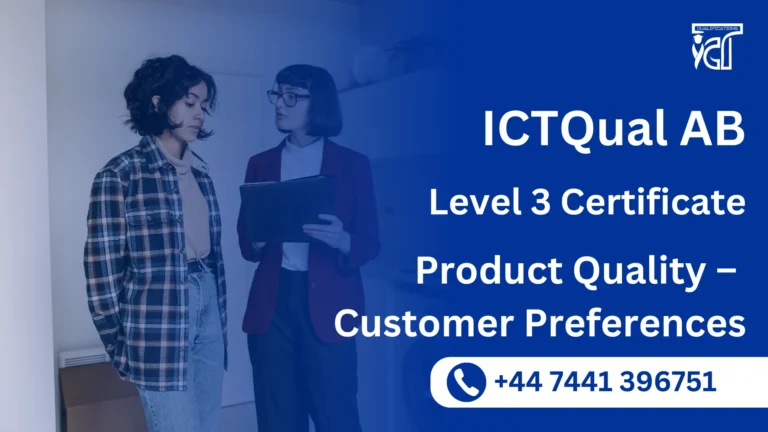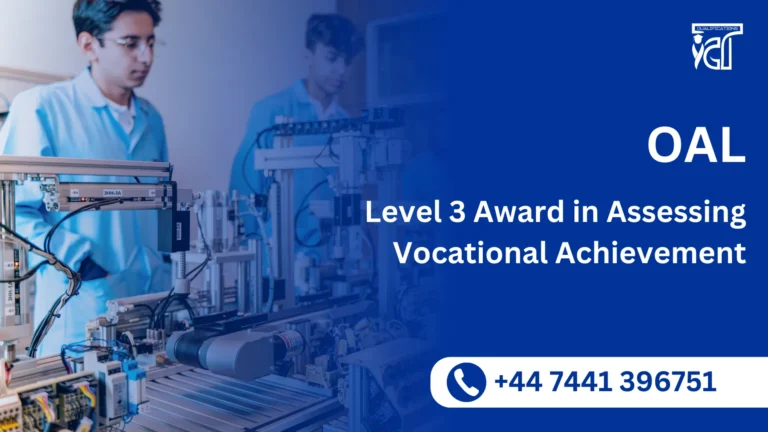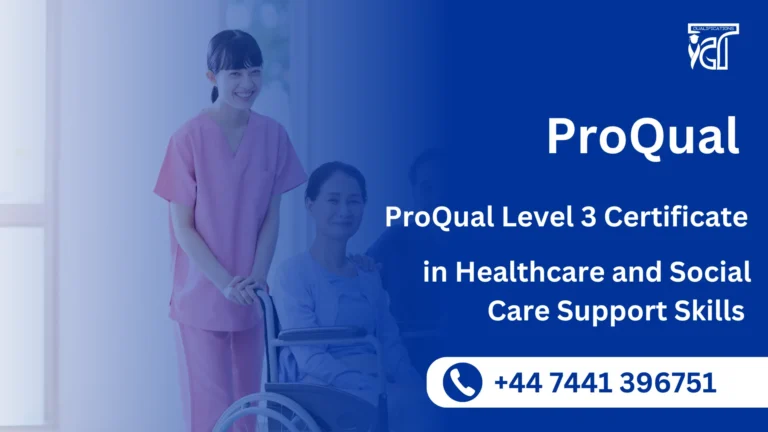If you’re looking to develop your career as an assessor within a work environment, the Focus Awards Level 3 Award in Assessing Competence in the Work Environment (RQF) is an essential qualification to consider. This internationally recognized, Ofqual-regulated qualification equips professionals with the knowledge and skills necessary to assess vocational qualifications in a real-world work environment. Whether you’re an experienced professional looking to formalize your skills or someone starting out in vocational assessment, this course offers practical, hands-on expertise that will open doors to career advancement in various industries.
The Focus Awards Level 3 Award in Assessing Competence in the Work Environment (RQF) provides you with a comprehensive understanding of assessing vocational competencies in the workplace. It is designed for those who assess employees’ performance and competence within their job roles, ensuring that assessments are fair, consistent, and of the highest quality.
This qualification is recognized internationally and adheres to Ofqual regulations, ensuring that it meets industry standards and provides credibility to your professional expertise. Additionally, it is an assignment-based qualification, meaning you can study at your own pace, while balancing work and personal commitments.
The Level 3 Award in Assessing Competence in the Work Environment (RQF) covers a range of topics to provide you with a solid foundation in assessing workplace competencies. Throughout the course, you will explore essential assessment principles, tools, and practices that allow you to assess competently and fairly in a real-world environment.
The Focus Awards Level 3 Award in Assessing Competence in the Work Environment (RQF) is a comprehensive and flexible qualification that equips you with the essential skills to assess vocational competencies in real-world work environments. Whether you’re looking to start your career as an assessor or enhance your current expertise, this Ofqual-regulated qualification provides the knowledge, practical skills, and international recognition needed to succeed in vocational assessment.
Start your journey towards becoming an effective assessor today and take the next step in advancing your career in vocational education and training!
Focus Awards Level 3 Award in Assessing Competence in the Work Environment (RQF)
The Focus Awards Level 3 Award in Assessing Competence in the Work Environment (RQF) qualification consists of Total Qualification Time (TQT): 90, Guided Learning Hours (GLH): 54 and Credits : 9 for the completed qualification.
| Sr# | Unit Title | Credit | GLH |
|---|---|---|---|
| 1 | Understanding the principles and practices of assessment | 3 | 24 |
| 2 | Assess occupational competence in the work environment | 6 | 30 |
GLH (Guided Learning Hours) and TQT (Total Qualification Time) are terms commonly used in vocational qualifications to help define the amount of time a learner is expected to spend on their studies.
1. GLH (Guided Learning Hours)
GLH refers to the number of hours a learner spends being directly taught, supervised, or supported during their course. This includes the time spent in activities such as:
- Classroom instruction
- Practical workshops
- One-on-one tutoring or mentoring sessions
- Online learning sessions with tutor support
In other words, GLH represents the time that learners are actively engaged with their instructors or learning activities.
2. TQT (Total Qualification Time)
TQT represents the total amount of time a learner is expected to invest in completing a qualification, including:
- GLH (Guided Learning Hours): Time spent on direct learning, as explained above.
- Self-Directed Learning: This includes time spent on independent study, research, assignment completion, preparation for exams, and any other work the learner does outside of direct teaching hours.
TQT is a broader measure that includes all the time required to achieve the qualification. It helps learners and employers understand the overall commitment required for the qualification.
Key Differences Between GLH and TQT:
- GLH focuses on direct learning with guidance or supervision.
- TQT includes GLH as well as independent study time and other learning-related activities.
Example:
If a qualification has a TQT of 600 hours and a GLH of 250 hours, it means the learner should spend 250 hours in direct learning (classroom, online, or tutor-led sessions) and 350 hours on independent study or research.
Learning Outcomes for the Focus Awards Level 3 Award in Assessing Competence in the Work Environment (RQF)
1. Understanding the Principles and Practices of Assessment (3 Credits, 24 GLH)
Upon completing this unit, learners will be able to:
- Understand the principles of assessment, including the importance of fairness, transparency, and consistency in the assessment process.
- Demonstrate knowledge of the different types of assessment methods, their benefits, and limitations.
- Recognize the role of the assessor in evaluating learner performance and ensuring that assessments are valid, reliable, and fit for purpose.
- Explain the key concepts of validity, reliability, and authenticity in assessments.
- Understand how to plan assessments to meet the learning needs of individuals while adhering to regulatory standards.
2. Assess Occupational Competence in the Work Environment (3 Credits, 24 GLH)
Upon completing this unit, learners will be able to:
- Assess the competence of individuals in a workplace setting, ensuring that assessments reflect actual performance in the job role.
- Use appropriate assessment methods to evaluate learners’ vocational skills, knowledge, and competence.
- Understand how to collect evidence of competence, including direct observation, questioning, and supplementary documentation.
- Provide clear and constructive feedback to learners, helping them improve their performance.
- Maintain records of assessments and ensure that they comply with organizational and regulatory requirements.
- Ensure that assessments are carried out in a fair, ethical, and transparent manner.
These learning outcomes aim to equip learners with the skills and knowledge necessary to assess vocational competencies effectively, contributing to improved learner outcomes and maintaining the standards of assessment within the work environment.
Benefits of the Focus Awards Level 3 Award in Assessing Competence in the Work Environment (RQF)
The Focus Awards Level 3 Award in Assessing Competence in the Work Environment (RQF) offers a wide range of benefits for individuals looking to enhance their career in vocational assessment and improve the quality of assessments in real-world work environments. Here are the key advantages of completing this course:
1. Industry-Recognized Qualification
- This qualification is Ofqual-regulated, ensuring that it meets the highest industry standards and is widely recognized by employers across various sectors.
- Being a globally accepted qualification, it provides you with the credibility and skills to assess in a wide range of professional environments, increasing your employability and career prospects internationally.
2. Flexible, Assignment-Based Learning
- The entirely assignment-based structure allows you to study at your own pace, fitting the learning around your personal and professional commitments.
- The course provides practical, hands-on assessment tasks, enabling you to gain real-world experience that directly applies to your role as an assessor.
3. Improved Assessing Skills
- This qualification equips you with core assessment techniques, helping you develop the ability to assess occupational competence effectively in real-world settings.
- Gain an in-depth understanding of assessment methods, tools, and best practices, allowing you to assess candidates fairly and accurately in the workplace.
4. Career Advancement Opportunities
- Completing this qualification can significantly enhance your career by positioning you as a qualified vocational assessor, a key role within many industries such as education, health and social care, engineering, and business services.
- It provides an excellent foundation for progressing to higher-level qualifications, such as the Level 4 Award in Internal Quality Assurance, opening up more senior roles in assessment and quality assurance.
5. Develop Effective Feedback Skills
- Learn how to provide constructive feedback to learners, helping them develop and improve their vocational skills. This supports both individual growth and the success of the organization.
- By improving feedback skills, you also enhance the learning process, ensuring that assessments are not only fair but also valuable for professional development.
6. Ensure Consistency and Fairness
- This qualification emphasizes the importance of fairness, consistency, and transparency in assessment. As a result, you will be equipped to maintain high standards of assessment across your organization, ensuring that all learners are assessed equitably.
- You’ll learn how to adhere to regulatory and organizational standards, ensuring that your assessments meet the required compliance regulations.
7. Greater Job Security
- As an accredited assessor, you will be able to assess a variety of candidates within the work environment, increasing your versatility and making you a valuable asset to your organization.
- Being qualified in assessing occupational competence helps strengthen your professional profile, improving your job security and potential to take on leadership roles in assessment and training.
8. Contribute to the Development of Skilled Workers
- By becoming a qualified assessor, you’ll play a key role in shaping the development of the workforce by ensuring that workers are competent and capable of meeting industry standards.
- Your work directly contributes to the development of a more skilled, capable, and productive workforce, helping improve the overall performance of organizations.
9. Hands-On, Real-World Application
- This course prepares you to assess vocational competence in the work environment, giving you the tools and techniques necessary to apply what you learn directly within your role.
- As the qualification focuses on real-world scenarios, you’ll gain immediate, practical experience that can be used in any work environment where vocational competence is assessed.
10. Networking Opportunities
- Completing the Level 3 Award in Assessing Competence in the Work Environment (RQF) gives you access to a community of professionals and organizations involved in assessment and training.
- Networking with other qualified assessors and professionals can provide valuable opportunities for collaboration, learning, and professional growth.
Best Fit for the Focus Awards Level 3 Award in Assessing Competence in the Work Environment (RQF)
The Focus Awards Level 3 Award in Assessing Competence in the Work Environment (RQF) is ideal for professionals who are looking to develop or formalize their assessment skills in real-world work environments. Here’s the best fit for this course:
1. Aspiring or Current Assessors
- This course is perfect for individuals who want to become qualified assessors in any sector, particularly those involved in vocational training or workplace learning.
- Existing assessors who wish to enhance their understanding of occupational competence assessment will benefit from this qualification, helping them gain greater confidence and improve their practices.
2. Vocational Trainers and Instructors
- If you are a trainer or instructor working in vocational education or industry-specific training, this course will give you the tools to assess learner competence effectively in a real-world context.
- It’s an excellent choice for those who wish to assess learners’ practical skills and ensure they meet industry standards, thereby contributing to the development of skilled professionals.
3. Professionals in HR, Learning and Development (L&D), or Quality Assurance
- HR professionals, L&D specialists, and quality assurance practitioners involved in training, assessment, or certification will find this qualification incredibly useful.
- It will equip you with the knowledge and skills to assess vocational skills, provide constructive feedback, and maintain consistent assessment practices within your organization.
4. Managers and Supervisors in the Workplace
- Managers or supervisors who are responsible for assessing the performance of employees or team members in any industry can use this qualification to enhance their skills in assessing occupational competence.
- Those with responsibility for employee development, upskilling, or competency assessments will be able to integrate best practices in assessment into their role, ensuring their team members meet professional standards.
5. Individuals Seeking Career Advancement
- This qualification is ideal for anyone who is looking to advance their career in assessment or vocational education, especially if you aim to progress into more senior roles in training or quality assurance.
- It also serves as a stepping stone to higher-level qualifications, such as the Level 4 Award in Internal Quality Assurance, if you wish to further your expertise in quality management or internal auditing.
6. Employees in Regulated Industries
- If you work in an industry where assessments are crucial for compliance (such as healthcare, engineering, construction, or finance), this course will help you meet the necessary standards for assessing and verifying vocational competencies in regulated work environments.
7. Individuals Interested in Independent Assessment Work
- Those seeking to work as freelance assessors or self-employed assessors will benefit from this qualification, as it enables them to assess vocational skills across various industries and sectors.
Entry Requirements
Register Now
Qualification Process
Qualification Process for the Focus Awards Level 3 Award in Assessing Competence in the Work Environment (RQF)
- Self-Assessment:
Begin by evaluating your eligibility to ensure you meet the qualification requirements, including work experience, knowledge, and language proficiency. - Registration:
Complete your registration by submitting the required documents, including a scanned copy of a valid ID, and paying the registration fee. - Induction:
An assessor will conduct an induction to confirm your eligibility for the course and explain the evidence requirements. If you do not meet the criteria, your registration will be canceled, and the fee will be refunded. - Assignmnets & Evidence Submission:
Provide all assignmnets and the necessary evidence based on the assessment criteria outlined in the course. If you are unsure of the required evidence, consult with the assessor for guidance on the type and nature of evidence needed. - Feedback and Revision:
The assessor will review your submitted evidence and provide feedback. Evidence that meets the criteria will be marked as “Criteria Met,” while any gaps will be identified. You will be asked to revise and resubmit if needed. - Competence Evidence:
Submit final evidence demonstrating that all learning outcomes have been met. This evidence will be marked as “Criteria Met” by the assessor once it is satisfactory. - Internal Quality Assurance (IQA):
The Internal Quality Assurance Verifier (IQA) will review your evidence to ensure consistency, quality, and compliance with standards. - External Verification:
The IQA will submit your portfolio to Focus Award External Quality Assurance Verifiers (EQA) for final confirmation. The EQA may contact you directly to verify the authenticity of your evidence. - Certification:
Upon successful completion of all checks, FOCUS AWARD will issue your official certificate, confirming that you have attained the Focus Awards Level 3 Award in Assessing Competence in the Work Environment (RQF)







